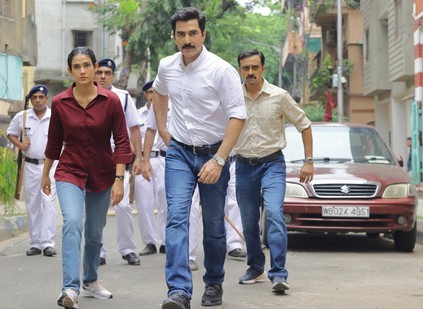Kolkata Confidential:
The title song lists the various things Bengal is famous for and then promises to show a “ek aur rang”, which is the kind of macho, gruesome violence usually seen in shows set in the lawless Hindi belt. Neeraj Pandey’s Khakee: The Bihar Chapter was one such, based on a true story.
The next, in what could have as many editions as there are states in India, Khakee: The Bengal Chapter, is fictional—created by Pandey, directed by Debatma Mandal and Tushar Kanti Ray, with three writers and four cinematographers on board, to capture the colonial era magnificent backdrops, the traditional mansions as well as the grunge of the streets, the Ambassador cars, the crowded padas. The ghettos are where armies of unemployed men are locked into unwritten pacts of loyalty to gang lords, who, in turn, are protected by the ruling party. The seven-part series on Netflix also gathers up some of the best actors in West Bengal to play the lead roles, whose Bengali-sprinkled Hindi is spoken perfectly.
Barun Roy (a chilling Prosenjit Chatterjee) is the de facto mover and shaker of a party that has a dessicated old man (Subhashish Mukerjee), as the Chief Minister just in name. The opposition trouble maker is a cotton sari-clad Nibedita (Chitragnda Singh), always ready with a mob and a protest procession. That these two resemble real life politicians would not be lost on the attentive news watcher.
Barun’s cohort is the ferocious Shankar aka Bagha (Saswata Chatterjee), who is capable of single-handed carnages, which is how he captured the Kolkata underworld, and became so powerful that nobody dares cross him. One honest Special Investigative Team (SIT) officer (Parambrata Chattopadhyay in a guest appearance) who tried to control Bagha’s reign of terror is killed, not by him, but his hotheaded aide, Sagor (Ritwik Bhowmik) and his Bihari teammate Ranjit (Aadil Zafar Khan).
All this background is dispensed with in a couple of episodes, to make way for the entry of Arjun Maitra (Jeet), the shrewd, fearless and honest cop, who decides to clean up the city of its human vermin. Along with his small team of loyal cops—and one mole—including Aratrika (Aakanksha Singh) and Himel (Mimoh Chakraborty), he goes in guns blazing, ignoring orders if need be.
In spirit, this is like so many cop-gangster-politician nexus films and shows that have been seen before, what makes this one several degrees superior is cultural specificity, some unusual characters (like Bagha’s Chinese son, Cheena, played by Tenzin Bodh), and some thrilling action set pieces in eye-catching locations—the one in an organ-trafficking ‘factory’ and a boatyard stand out, amidst the usual chases down narrow streets.
Even when he is thwarted with a promotion to take him off the field as installed as the CM’s security, Arjun pulls invisible strings to unravel Barun and Sagor’s criminal network. Like so many maverick screen cops, he is not averse encounter killings.
The scenes between the violent interludes (a decapitated head used as a football!), of the relationships and interactions between various characters are thoughtfully written. The “Jai-Veeru”—referred to as such by others– friendship between Sagor and Rajit cannot withstand jealousy, a devious crime, an accidental tragedy, and takes on the tone of an epic battle that burns everything in its path. Arjun just has to fan the flames.
In this macho world, some space is made for the women—Bagha worships his mother, Arjun and Sagor have a romantic, yet respectful relationship with their wives; Nibedita is a firebrand opposition leader, but also cares for her lover in a coma, Aratrika never shies away from a gunfight (and like a squeamish superior does not faint at the sight of a decomposed body). The one who helps Arjun crack the case is an ex-girlfriend, with whom he maintains a civilized, if need-based friendship.
Jeet (a Sindhi star in West Bengal) is a good casting choice—he has an almost avuncular expression, but also the hawkish sharpness that does not miss anything. Prosenjit Chatterjee, Saswata Chatterjee, Chitrangda Singh do not let their star shadows cover the younger actors; Ritwik Bhowmik seen in romantic roles, transforms easily into a street thug, as understated as Aadil Zafar Khan’s conventionally handsome Ranjit is deliberately over-the-top.
In spite of the overused crime show tropes, The Bengal Chapter has attention to detail as well as elements of unpredictability. It is too violent, but that is now par for the course, still, some of the killings are flinch worthy.
(This piece first appeared in scroll.in)

